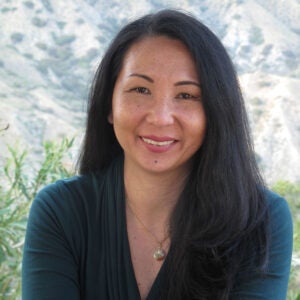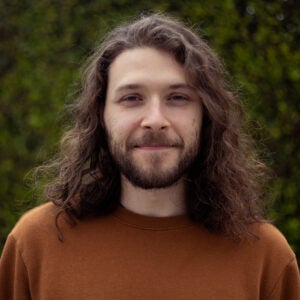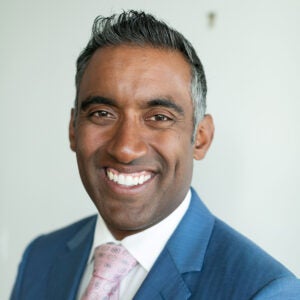
What can you do with a math degree? The options are nearly infinite
When David Crombecque first joined the Department of Mathematics faculty at the USC Dornsife College of Letters, Arts and Sciences in 2012, he routinely heard students questioning their career prospects with a math degree.
“Maybe I could teach?” he heard students wonder aloud.
Yet, Crombecque, professor (teaching) of mathematics, knew more possibilities existed for the university’s math majors.
With the unrelenting rise of technology, the accelerating importance of data across industries and, above all, the rigorous problem-solving skills mathematics courses cultivated in a liberal arts college, Crombecque believed mathematics majors’ professional capabilities extended far beyond what many students imagined.
To illustrate that point, Crombecque launched an annual career panel for math majors alongside fellow faculty member Cymra Haskell, professor (teaching) of mathematics.
In 2015, they began inviting a handful of USC Dornsife math alumni to campus each spring to share how their math education propelled their professional pursuits.
The personal stories of alumni representing fields such as law, medicine, consulting, tech and finance underscored the versatility of a math degree and its promise in the marketplace.
“Math majors are not scared of numbers and understand the hunt for solutions, and those are valuable skills in many fields today,” says Crombecque, who also served as the USC Math Club’s advisor for six years.
Those two skills alone — problem-solving ability paired with a high level of quantitative literacy, which Crombecque defines as the ability to understand and handle numbers — position math majors to contribute in various professional roles and industries. For instance, in politics, those skills help strengthen policy positions; in consumer technology, they help drive decision-making around a key go-to-market strategy like pricing.
“Math students know how to use numbers to make an argument, and regardless of the field you’re in today, you’re going to be asked to back up an idea with numbers and data,” Crombecque says.
In addition, rigor is baked into mathematics training at USC Dornsife. Students develop the ability to think through a complex problem logically and arrive at precise conclusions. In professional fields like law and engineering — two common professional landing spots for math majors — such intellectual persistence spurs results.
The value of mathematical skills in the marketplace has trickled down from industries to universities to high schools, where young students increasingly recognize mathematics’ role in hot fields like artificial intelligence, machine learning and data science. That’s one reason, Crombecque says, the number of math majors at USC has surged over recent years, rising nearly 27% from 2019 to 2022. Today, USC Dornsife hosts nearly 500 mathematics majors.
“There’s no longer this narrow thought that math majors are pigeonholed into teaching or becoming accountants,” he says. “Today’s students understand there’s so much more out there for them.”
And it helps as well that the university’s Department of Mathematics is housed in the USC Dornsife College of Letters, Arts and Sciences. While many other universities house mathematics in a college of engineering, mathematics’ existence at USC alongside the humanities and social sciences spotlights math’s relationship with other fields, even seemingly disconnected ones like biology, political science, psychology and philosophy.
“This sends the important signal that math is not just for science,” Crombecque says. “Rather, math is part of a broader world and interacts with other disciplines.”
Given the fundamentals of math education at USC Dornsife and swelling marketplace interest in mathematical skills, math students’ career prospects continue expanding while alumni are thriving in diverse professional roles.
“The fact that we have alumni working for the big five consulting firms, tech enterprises like Google and Netflix, and in biotech, finance, law and so on shows the doors a USC math education opens,” Crombecque says. “It’s exciting to hear students talk about career possibilities with an enthusiasm and energy that wasn’t as apparent 10 years ago.”
Spotlight on Math Alumni
 Judy Lai-Norling ’99, chief operating officer at Carbon Mapper, credits much of her career success to her USC Dornsife math degree.
Judy Lai-Norling ’99, chief operating officer at Carbon Mapper, credits much of her career success to her USC Dornsife math degree.
“I spent 14 years at NASA’s Jet Propulsion Laboratory before joining Carbon Mapper, a nonprofit organization building satellites to detect methane and carbon dioxide in support of climate change action. … Not only did I receive a strong foundation in science and engineering concepts that help me understand and appreciate my team members’ work, but I also gained valuable mentorship and individual attention from multiple math professors who encouraged me to discuss complex topics and to seek guidance from those with more experience and knowledge.” — Judy Lai-Norling (BA, Mathematics, ’99; BS, Business Administration, ’99)
 Trevor Reed ’16, software engineer at Google, says his experience as a USC Dornsife math major gave him valuable communication skills.
Trevor Reed ’16, software engineer at Google, says his experience as a USC Dornsife math major gave him valuable communication skills.
“I learned how to communicate clearly and precisely with others about complex topics, not only in terms of technical details but also the practice of patience and empathy. This has been really helpful in the professional world, because miscommunication can introduce a lot of chaos into collaborative projects. I also learned how to build complex systems by breaking things down into simple, manageable components. This is an approach I use every day in my job when starting new projects or learning new technologies.” — Trevor Reed (BS, applied and computational mathematics, ’16)
 Attorney Nilay Vora ’04, founder of The Vora Law Firm, points to his USC Dornsife math studies as a factor that helped expand his thought processes.
Attorney Nilay Vora ’04, founder of The Vora Law Firm, points to his USC Dornsife math studies as a factor that helped expand his thought processes.
“I studied differential geometry as an undergraduate, and that trained me to be a creative thinker, an attribute few associate with mathematics. I learned to bend my mind to understand why things were true, things that violated my own vision of what I was experiencing in the world. I only got to the right answer by using my imagination. Every day as an attorney, I’m using that vital skill and process in my work.” — Nilay Vora (BA, mathematics, ’04; BA, interdisciplinary studies, ’04)